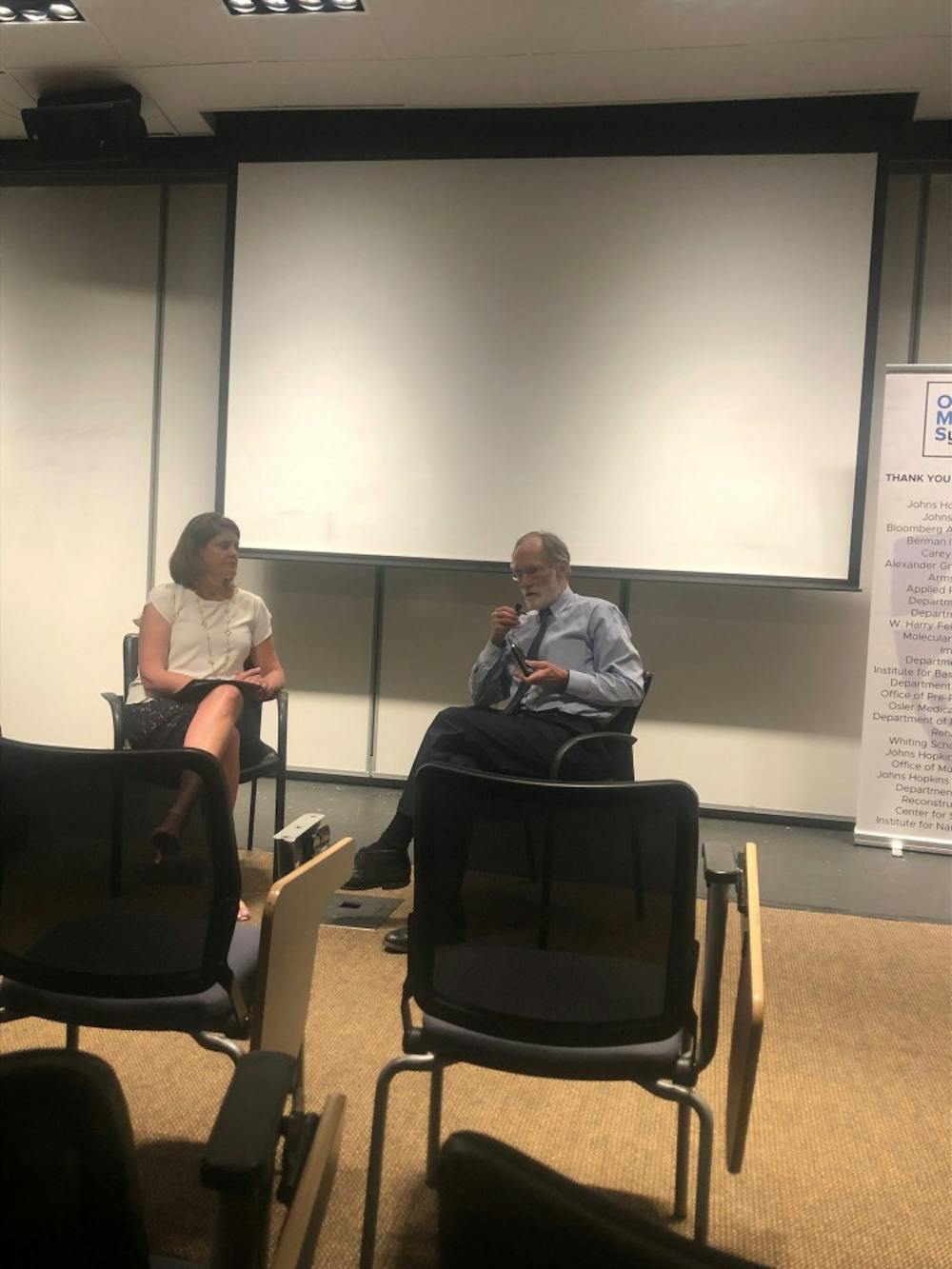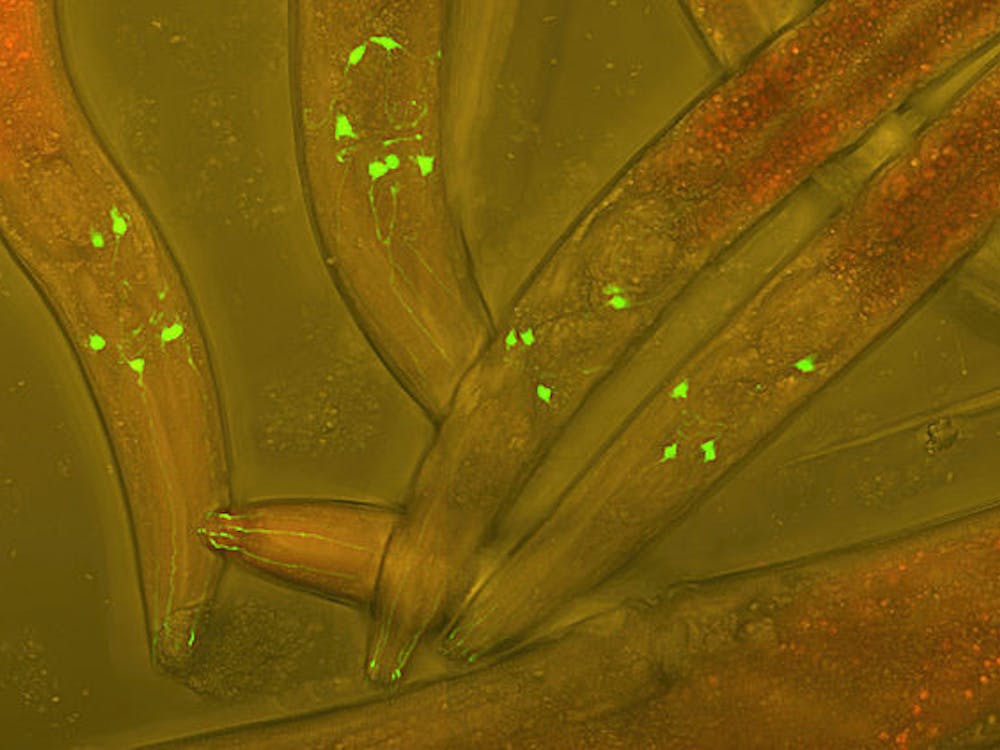The Osler Medical Symposium held their last event of the semester on Tuesday, hosting Dr. Peter Agre and Dr. Sheri Lewis. Agre is the recipient of the 2003 Nobel Prize in Chemistry and a Bloomberg Distinguished Professor. Lewis is the manager of the Global Disease Surveillance Program at the Applied Physics Laboratory.
Both speakers discussed their experiences in international diplomacy as it relates to medicine and public health.
Agre spoke about his projects that focused on improving global health. He detailed his work in Zambia, Zimbabwe, the Democratic Republic of the Congo, Cuba, Myanmar, Iran and the Democratic People’s Republic of North Korea. He explained that people respect the U.S. science community even in countries that have tense relationships with the U.S. government.
Lewis echoed Agre’s description of the international community’s perspective of U.S. research. She explained that she is often negatively received if she introduces herself as an affiliate of the U.S. Department of Defense but is positively regarded when she mentions her Hopkins research affiliation.
Both speakers identified challenges to global health work such as the lack of infrastructure or pervasive political corruption in some countries.
Agre and Lewis offered suggestions for how to develop and implement the most effective solutions to health issues abroad. Agre specifically emphasized the importance of forming personal connections with people in other countries by describing his experiences making friends in unlikely places.
He recounted an interaction he had with a leader of the North Korean Academy of Sciences named Dr. Hong. Hong told Agre about his grandson’s fear of and hostility towards Americans, and his grandson even urged him to arm himself with a rifle when he met the American scientists. Agre offered the man a box of American granola bars to give his grandson.
A year and a half later, Agre and Hong met again at a discussion for American and North Korean science leaders. Agre asked Hong how his grandson was doing, and noted that this question eased some tension in the room. Hong replied saying that his grandson did not ask him to bring his rifle to deal with Americans this time, but instead asked him to take some granola bars back to North Korea. Agre believes that although the exchange was small, it was significant.
“Perhaps it’s a trivial interaction, but I think it represented a little bit of friendship,” Agre said.
For Hopkins alumna Anita Louie, the stories that Agre and Lewis shared helped her to see the importance of personal relationships, even in scientific research.
“I was very impressed by how [Agre] had personal stories from each location … it really showed me that in the end, science is still about people,” she said in an interview with The News-Letter. “You’re not doing it because you care about numbers or anything like that, you’re doing it because you care about people.”
One common theme both Agre and Lewis addressed was that Americans and people in other countries have more in common than is often acknowledged. Lewis in particular highlighted human unity as it relates to health.
“Science and health and medicine is a great baseline for [diplomacy]. We all speak that common language when it comes to health,” he said.
Another point that both speakers highlighted in their presentations is that Americans should not go to less developed countries believing they know more about how to deal with an issue than those living there. Lewis explained that simply being a scientist from a place like the U.S. does not equate to being better equipped to solve problems.
“I think that when we hear the words ‘resource limited’ we immediately confuse that with ‘knowledge limited,’ and that is not the case,” Lewis said.
When college students asked what can be done in the field of scientific diplomacy, Agre offered multiple suggestions. He encouraged students to do work abroadsince his own passion for international travel developed when he visited the former Soviet Union at age 17.
He also mentioned that going forward he hopes to increase ties between Hopkins institutions in Baltimore and the School of Advanced International Studies.
Following the presentation, The News-Letter had the opportunity to sit down and speak with Agre. He stressed the role that people can play in bettering the world.
“I think the one takeaway is that, as American scientists, we have much to offer,” Agre said. “The world is still a fascinating and interesting place, and it’s constantly being made better by people who bring science and medicine with them.”
When asked about which accomplishment he is most proud of, Agre explained that his career is not just his own.
“Oftentimes things happen which I get credit for which involve a lot of luck and a lot of generous suggestions and help from others,” he said. “I don’t stake claim to any major credit. Even though I think the Nobel Prize is often viewed as a major trophy, I think it’s more of a trophy for the field and excellent PR for what we do as scientists.”
Sophomore Shihab Rahman, who is studying Biomedical Engineering, explained how the event helped him see science as a unifying field in an interview with The News-Letter .
“The thing that really hit home for me was this idea of science bringing people from all places and all walks of life together … using something as quantitative, objective and seemingly devoid of emotion as science to bring people together,” he said.





